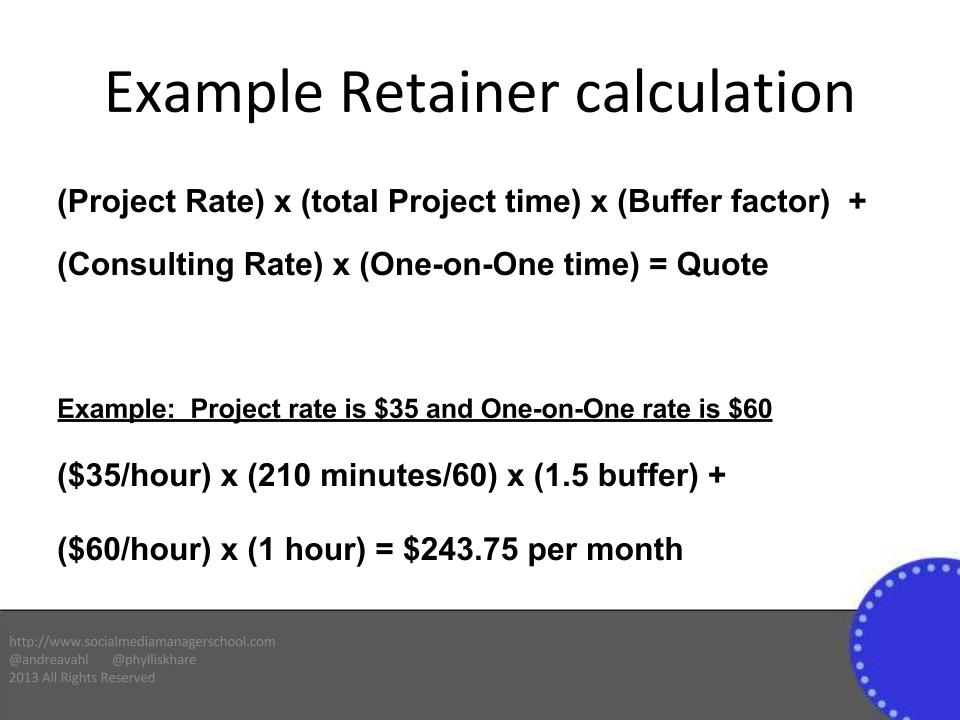
Are you starting your own consulting business and wondering how to price your services? The topic of setting your rates, pricing a project, and figuring out retainer fees is one that comes up most often in Social Media Manager School.
So we created a whole series of webinars around the topic but I wanted to share some of the concepts we discussed here.
Typically there are 3 models of pricing: hourly rates, project-based quotes, and monthly retainers. Depending on your business model you may need all three.
Setting Your Hourly Rate
There are a lot of moving parts when you are looking at setting an hourly rate for your consulting time. Typically your clients may not want to pay an hourly rate for a project you do because many worry that there isn’t incentive for you to finish the project in a timely manner.
But if you are doing one-on-one consulting, you need to have an hourly rate for your time. And your time is your most valuable asset so make sure you are factoring all the overhead you have to get that paid hour.
Here are some considerations when calculating this rate.
- Overhead and expenses (and TAXES)
Think of all the Apps, tools, fees, hardware, conferences, continuing education that goes into your business.
- Time for Marketing and Administration
Billable hours may be only about 50% of total work week. Typically if you work a 40 hour work week, you may only be able to schedule client meetings for 20 of those hours. The rest is spent with follow up, administration, and marketing your business.
- Other income sources/projects
Are you doing projects/training/products? If consulting is only a part of your business, figure out exactly how many hours a week you have to devote to one-on-one time.
Let’s first examine Overhead, Expenses, and Taxes. Make a list of your typical monthly expenses and any large one time expenses you might have to give a quick estimate of where you might be for the year. If you are just starting out and don’t have a good feel for what your expenses are going to be, then do a general estimate.
In general, you can plan on expenses and taxes taking between 30-50% of your yearly income. Possibly more if you have some big expenditures or if you have employees or contract workers. For example if you want to earn $50,000 Net Income – plan on targeting between $72,000 – $100,000 in total income.
Next let’s look at how many billable hours you have each week. If you are doing other projects, then you should factor in how many hours those will take out of your weekly total hours. Make sure you are not over estimating how many hours you can fill with clients. Typically if all you are doing is consulting work, you still will need 50% of your time for other activities such as marketing and networking.
If you are only filling part of your time and income stream with consulting, figure out how many hours you have for consulting and calculate what percentage of your total income you want to earn from the consulting piece of your business.
When you have those numbers, plug them into this formula:
So for example:
Of course, you may need to factor in other things, such as your experience level, your niche, your area. This is intended as a place to start.
Quoting a Project
Project work can be different. You aren’t going to necessarily charge the same hourly rate that you would for a one-on-one consultation because you can fit that time into your work day differently and you may be able to outsource some of the project work to a team member or a contract worker who does part of the project for you.
So if your one-on-one rate is $75/hour then your project rate may be $50/hour. You aren’t telling your client exactly how many hours everything will take, the hourly rate is for your estimation purposes only so that you can figure out what to quote.
Quoting a project can be challenging because you may not be sure how long things will take.
What I like to do is to do a small part of the project (if possible) and then scale that to the full project. So if the project is to write 300 Tweets for a client then I start with writing 10 tweets and time how long that takes. I also always add a buffer, especially if this is the first time I’m doing the project. As you learn exactly how much time it takes to complete a task you do often, then you will get better at estimating. But it’s in your best interest to add a buffer to allow for things that can go wrong on a project.
Here is my general formula:
(% of Project) x (Time it takes to do % of project) x (Project Rate) x (Full scope of Project) x (Buffer) = Quote for Project
So let’s look at the example of writing 300 tweets as part of the project that you will be doing.
Start with a smaller % of the task
- Write 10 Tweets (really write them as you would)
Time how long it takes you
- It takes 10 minutes – some tweets are short, some require content research
Multiply that time by your Project Rate (Say your project rate is $35/hour)
- $35/hour x 10 minutes = $5.83
Multiply by the full scope of the Project
- 30 more times to complete the project x $5.83 = $175
Add a buffer (multiply by 2 or some factor – possibly 1.5)
- $175 x 1.5 = $262.50 for this part of the project
You may not be adding a buffer for each part of the project and if you have a lot of pieces in the project, you may just want to add a buffer at the end.
Again, this is a place to start, you may have many other factors that go into your quote and your price.
Quoting a Monthly Retainer
Quoting a monthly retainer is going to be similar to quoting a project because you typically are doing the same tasks each month for your client. In a monthly retainer you may also have monthly calls, e-mails, and one-on-one consulting time to factor in.
Make sure you spell out to your client exactly how many e-mails and phone calls are included because that can eat up your time quickly! Having good boundaries will help you stay profitable.
Also beware of “scope creep” where the client wants to add one more quick thing in your monthly duties.
If you have you have one-on-one time and project time for the client, make sure you are billing those rates correctly in your monthly retainer quote. Again, you aren’t going to share exactly how much time your tasks take, this is just for your calculation purposes only.
Download a FREE Guide
Do you want all this info in a handy downloadable? Get our Pricing Guide for Social Media here with all these formulas and more:
This is just one of the many crazy-useful things in our Social Media Manager School. We typically open the school to new students twice per year, in the Spring and in the Fall.
Again, all of this is intended as a general guide and a place to start. Do you have any thoughts to add about these models? Share in the comments below!



























Thanks for explaining those equations. That’s a solid plan for gauging what you need to consider before quoting a price.
What a great article. I never considered some of the factors you describe. The formulas you use here are going to be extremely helpful. I can stop determining my rate by throwing darts at a dartboard now.
This is an awesome, informative article. Thanks for making it so plain. This takes a lot of stress out of pricing and frees me to be more productive.
Hi Andrea. What a great article and help to the self employed social media managers and consultants and probably all freelancers. Grandma Mary would be proud of you!
Best wishes.
John.
This has great information! Thank you so much!
Thanks Andrea, this is very useful
Thank you, Andrea. Does it really only take you 10 minutes to write 10 original tweets? I have been asked for a quote to write 10 Tweets a week for a healthcare company, but to charge only $6 per week seems low. Searching for relevant, engaging content from other sources, as well as pulling content out of the client’s book and then crafting them into attention-grabbing “headlines” feels like it would take at least an hour to really do well, but is charging my hourly writing rate of $65 really that far off from what social media freelancers are charging?
No no – usually not but sometimes. If it’s an ongoing project and I know where to source the content from then yes, it can. Plus if they have content to draw from it makes it easier. But you are correct that the research definitely takes time and customers don’t always understand that!
Also remember that if you are only doing that for them, you aren’t leveraging the research for Facebook Posts and other places you might post. And you have to build in time for e-mails to the client and you do need to charge for your research time. Hope that helps!
Thank you for your reply! I did offer to include a paraphrased version for Facebook but they still just want a quote for 2 tweets per day, M -F. Since it is such a narrowly focused assignment it has been hard for me to find any posted pricing guidelines. Do you have a range suggestion? I am open to pricing by the tweet, by the week or monthly. Appreciate any input or insight. Thank you!
When will you offer Social Media Manager School again?
Hi Rachel! It’s opening officially tomorrow! http://www.socialmediamanagerschool.com (but it’s secretly open one day early 🙂 We usually open in the spring and in the fall.
Great advice and information Andrea! 🙂 Thanks for sharing
Hello there… I have learned lot right thing stuff here. Certainly it is worth bookmarking for revisiting. I wonder how so much effort you place to make such a fantastic informative web site. Thank you so much for this wonderful post.
http://trumpetermedia.com/
Great way to calculate wages Andrea. Thanks, it will help a lot of people.
Great break down! Very easy to follow. Thank you!
I put this together in a Google Spreadsheet to quickly analyze some of the pieces of pricing quickly. I like your algorithm. Hope this helps!
function findMyCharge (testScope,testTimeFrame,hourlyRate,fullScope,bufferAmount)
{
// Time how long it takes you
// It takes 10 minutes – some tweets are short
// some require content research
var timeFrame = testTimeFrame / 60;
// Multiply that time by your Project Rate (Say your project rate is $35/hour)
// $35/hour x 10 minutes = $5.83
var costForTestScope = (timeFrame * hourlyRate);
// Multiply by the full scope of the Project
// 30 more times to complete the project x $5.83 = $175
var scopeToComplete = fullScope / testScope;
var costToComplete = scopeToComplete * costForTestScope;
return costToComplete * bufferAmount;
}